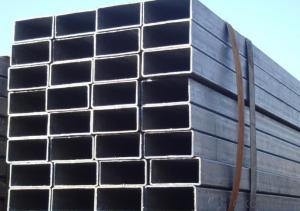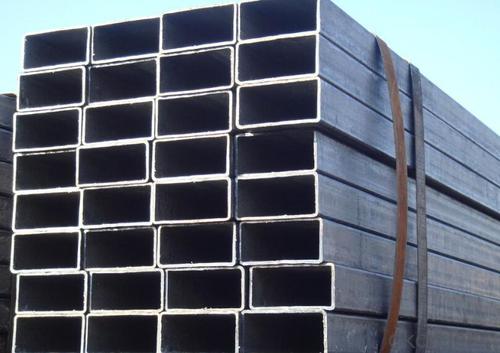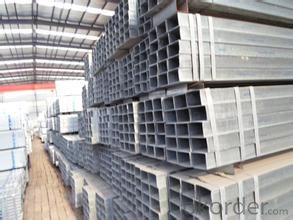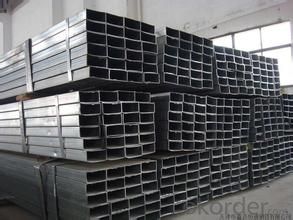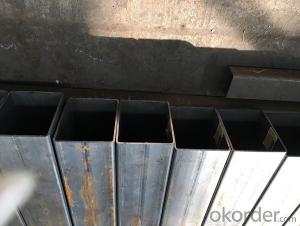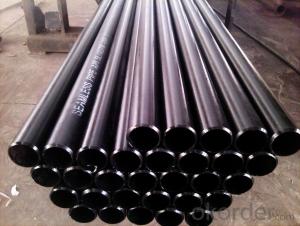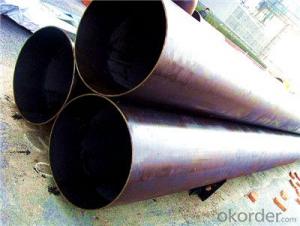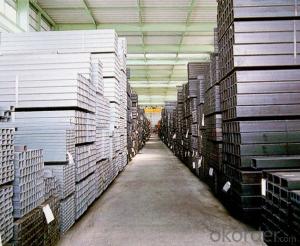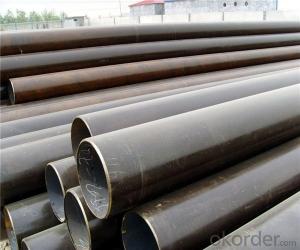Square Carbon Steel Pipes With Reasonable Price
- Loading Port:
- China main port
- Payment Terms:
- TT or LC
- Min Order Qty:
- 100 m.t.
- Supply Capability:
- 10000 m.t./month
OKorder Service Pledge
OKorder Financial Service
You Might Also Like
1.Quick Details
Thickness: | 1.0 - 35 mm | Section Shape: | Square | Outer Diameter: | 20*20-600*600 |
Place of Origin: | Shandong China (Mainland) | Secondary Or Not: | Non-secondary | Application: | Structure Pipe |
Technique: | Cold Rolled | Certification: | CE | Surface Treatment: | oil,paint |
Special Pipe: | Thick Wall Pipe | Alloy Or Not: | Non-alloy | Name: | Square Hollow Steel Pipe/Tube |
Shape: | Square/Rectangular | Yield Strength: | 360-380Mpa | Tensile Strength: | 560-580Mpa |
Elongation: | 24-28% | Bend Test: | Qualified | Impact Value: | V-notch |
Grade: | 20#,45#,16Mn,A210,St45,Q235,Q345,Q195,Q215,10#-45#,A53-A369,ST35-ST52,Q195-Q345 | Standard: | JIS G3465-2006,JIS G3466,GB/T 3094 |
2.Specifications
1. OD:15X15-800X800MM,20X30--600X800MM
2. Thick.:1.0--35.0MM
3.FAQ of Rectangular Steel Tube
①How is the quality of your products?
Our products are manufactured strictly according to national and internaional standard, and we take a test
on every pipe before delivered out. If you want see our quality certifications and all kinds of testing report, please just ask us for it.
Guaranteed: If products’ quality don’t accord to discription as we give or the promise before you place order, we promise 100% refund.
②How about price?
We have a policy that “ for saving time and absolutely honest business attitude, we quote as lowest as possible for any customer, and discount can be given according to quantity”,if you like bargain and factory price is not low enough as you think, just don’t waste your time.Please trust the quotation we would give you, it is professional one.
③Why should you chose us?
Chose happens because of quality, then price, We can give you both.Additionally, we can also offer professional products inquiry, products knowledge train(for agents), smooth goods delivery, exellent customer solution proposals.Our service formula: good quality+good price+good service=customer’s trust
SGS test is available, customer inspection before shipping is welcome, third party inspection is no problem.
If you have any question, pls feel free to contact us !
4.Rectangular Hot Rolled Steel Tube Image
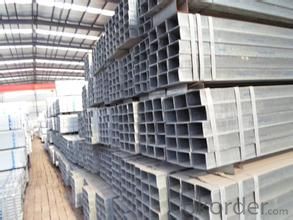
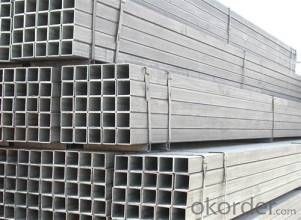
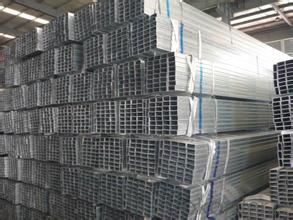
- Q: How are steel pipes inspected for compliance with industry standards?
- Steel pipes are inspected for compliance with industry standards through various methods such as visual examination, non-destructive testing techniques like ultrasonic testing, magnetic particle inspection, and radiography. These inspections help ensure that the pipes meet required specifications and quality standards, ensuring their integrity and safety for use in various industries.
- Q: How are steel pipes recycled at the end of their life cycle?
- Steel pipes are typically recycled at the end of their life cycle through a process called steel recycling. This involves collecting the used pipes, separating them from other materials, and then melting them down to be formed into new steel products. The recycling process not only helps conserve valuable resources but also reduces the need for new steel production, making it an environmentally sustainable solution.
- Q: How are steel pipes coated for aesthetic purposes?
- There are various ways to coat steel pipes for aesthetic purposes. One commonly used method is to apply a powder coating. This involves spraying a dry powder onto the pipe's surface and then heating it to create a durable and attractive finish. Powder coating offers a wide range of color options and provides a smooth coating. Another method is electroplating, which involves immersing the pipe in a solution containing metal ions and passing an electric current through it. This creates a thin, decorative layer on the surface of the pipe. Electroplating can produce shiny, reflective surfaces or more matte, textured appearances. Painting is also a popular method for coating steel pipes aesthetically. It involves applying liquid paint or enamel to the pipe's surface. By choosing different colors, textures, and finishes, painting allows for a variety of aesthetic possibilities. However, it is crucial to use paint specifically formulated for metal surfaces and capable of withstanding environmental conditions. In addition to these methods, steel pipes can be coated using techniques like hot-dip galvanizing or metal cladding. These processes involve applying a layer of another metal, such as zinc or aluminum, to the pipe's surface. This not only enhances the appearance but also protects against corrosion, extending the pipe's lifespan. Overall, there are multiple methods available for aesthetically coating steel pipes. Each method has its own advantages and should be selected based on the desired appearance, durability, and environmental conditions. Factors like color, texture, finish, and protective properties must be considered to ensure the desired aesthetic result is achieved.
- Q: What are the lengths of scaffold steel tubes?
- Used to build scaffolding of steel pipes in general have two kinds, an outer diameter 48mm, wall thickness 3.5mm; another kind of outer diameter 51mm, wall thickness 3mm; according to its location and role of different, can be divided into vertical pole, horizontal rod, sweeping rod, etc.. According to the technical specification for construction of steel tubular scaffold with couplers, JGJ 130 - 2011[1]. The scaffolding steel pipe should be specified with the current national standard "GB/T13793" or "straight seam welded steel pipe welded steel pipe for low pressure liquid delivery" GB/T3091 Q235 ordinary steel pipe; steel pipe steel quality should meet the requirements of current national standard grade Q235 steel "carbon structural steel" in GB/T700. The scaffold pipe shall be made of a diameter of 48.3 * 3.6 steel tubes. The maximum mass of each steel tube shall not be greater than 25.8kg.
- Q: What is the creep resistance of steel pipes?
- The creep resistance of steel pipes refers to their ability to withstand deformation or strain under long-term exposure to high temperatures and constant stress. Steel pipes exhibit good creep resistance due to their high melting point and structural integrity, making them suitable for applications that involve elevated temperatures and prolonged use.
- Q: Are steel pipes suitable for transporting fluids?
- Yes, steel pipes are suitable for transporting fluids. They have high strength and durability, can withstand high pressure and temperature, and are resistant to corrosion, making them ideal for various fluid transportation applications such as oil, gas, water, and sewage.
- Q: How are steel pipes used in the manufacturing of boilers?
- Due to their strength, durability, and heat-resistant properties, steel pipes are essential components in the manufacturing of boilers. Boilers are utilized in various industrial and commercial applications to generate steam or heat water. The construction of boiler tubes is where steel pipes are primarily employed, as they function as the main heat transfer medium. Considering the high temperatures and pressure that these tubes are subjected to, it is crucial to use a material that can withstand such extreme conditions. Steel, with its excellent mechanical properties and corrosion resistance, is the ideal choice for this purpose. To create the boiler tubes, the manufacturing process involves shaping and sizing the steel pipes accordingly. These tubes are then connected to form a network of channels through which hot gases or water can flow. Depending on the boiler design requirements, the steel pipes utilized in this process are often seamless or welded. For the safety and efficiency of the system, the steel pipes used in boilers must meet stringent quality standards. They are subjected to tests to ensure their ability to withstand high pressure, temperature, and corrosion. Furthermore, inspections and tests such as ultrasonic testing and radiographic examination are conducted to identify any defects or flaws that might compromise the performance of the boiler. In conclusion, steel pipes play a critical role in the manufacturing of boilers by serving as the primary material for boiler tubes. Their strength, durability, and heat-resistant properties make them suitable for enduring high temperatures and pressure. These pipes undergo rigorous testing to guarantee their quality and reliability in creating efficient and safe boiler systems.
- Q: How are steel pipes repaired in case of damage?
- Steel pipes are repaired in case of damage through various methods such as welding, patching, or replacing the damaged section. The appropriate repair technique depends on the type and extent of the damage to ensure the structural integrity and functionality of the pipe.
- Q: What are the different types of steel pipe supports for overhead piping?
- There are several types of steel pipe supports for overhead piping, including pipe hangers, pipe clamps, beam clamps, and pipe rollers. Pipe hangers are used to support vertical pipes, while pipe clamps provide support for horizontal pipes. Beam clamps are designed to attach to structural beams and provide support for the pipe. Pipe rollers are used to allow the pipe to move freely, accommodating expansion and contraction.
- Q: How are steel pipes classified based on their wall thickness?
- Steel pipes are classified based on their wall thickness into three categories: standard weight, extra-strong, and double extra-strong.
Send your message to us
Square Carbon Steel Pipes With Reasonable Price
- Loading Port:
- China main port
- Payment Terms:
- TT or LC
- Min Order Qty:
- 100 m.t.
- Supply Capability:
- 10000 m.t./month
OKorder Service Pledge
OKorder Financial Service
Similar products
Hot products
Hot Searches
Related keywords
